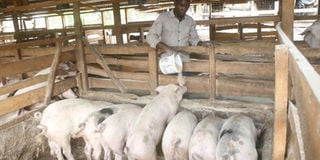Boda boda members ride high with pig farm

Daniel Kung’u, the chairman of New Honi Youth Group, feeds their pigs in Chaka, Nyeri County. The group has 100 pigs. PHOTO | JOSEPH KANYI | NMG
What you need to know:
- The agribusiness was started by the nine men and six women four years ago through a table banking system where each member contributed Sh250 per month.
- Chairman Daniel Kung’u says they started the farm to get alternative income away from motorbike taxis that a majority of them operate.
- The farm sitting on quarter acre belonging to one of the group members has several housing units for the animals. The group has leased the land.
- The group has since received a grant of Sh855,000 from International Fund for Agricultural Development (IFAD) that facilitated them to construct pig pens and bought them an additional ten pigs.
The vehicle skids at a muddy stretch off the main road in Kieni, Nyeri County, as we head to Karundas village to meet a pig farming group.
Soon, we arrive on the farm where New Honi Youth group members keep the animals.
The agribusiness was started by the nine men and six women four years ago through a table banking system where each member contributed Sh250 per month.
Christopher Wachira, a member, is cleaning the pigsties and checking the pigs for any problems. The air is clean, free of odour associated with many pigsties.
“It all depends with what a farmer decides to feed the animals and how he takes care of them. We clean the pens daily,” says Wachira, a group member.
Chairman Daniel Kung’u says they started the farm to get alternative income away from motorbike taxis that a majority of them operate.
“We held a meeting and discussed the issue and pig farming seemed the only viable agri-venture we could do. We built a pen that would later house 14 piglets after about a year,” says Kung’u.
Honi group started with a Sh25,000 sow that birthed to 14 piglets almost a year later, which was a breakthrough for us even in sourcing for funds,” he said.
They now have 120 animal, 20 which are piglets. The group feeds the animals only commercial feeds, giving a wide berth to leftovers from markets, hotels, schools and garbage sites, which many farmers love.
Kung’u argues that while leftovers are cheap, not knowing the source of the feeds may cause more harm than good in the long run as they may contain pathogens causing diseases that would eat into profits.
“It is better we give the pigs manufactured feeds that contain balanced nutritional value so that the animals gain weight faster and we dispose them at a higher value.”
The feeds cost an average of Sh2,300 a bag at the various stages of growth.
They castrate all the male pigs 21 days after birth to prevent inbreeding.
The farm sitting on quarter acre belonging to one of the group members has several housing units for the animals. The group has leased the land.
DO NOT REQUIRE MUCH ATTENTION
There are furrowing pens for mothering sows, other for weaned piglets, others where fattening pigs are kept and dry pens for sows in early pregnancy.
Last month, the group earned Sh235,200 after selling 14 of their pigs to pork traders, with each animal weighing from 60kg to 70kg.
“We sell the pigs when they are between six to seven months to minimise losses arising from feeding them for more months. The 60kg to 70kg is the desired weight,” says Kung’u, adding that they sell some of the animals for Sh3,500 at two months.
More money comes manure which they sell at Sh4,000 per tonne.
Kung’u says they sell between 20 and 30 pigs in a good month, with the farmers ensuring the have animals to sell to their customers monthly.
Geoffrey Mutahi, the secretary of the group, says they settled on pigs because they were the easiest to maintain and are lucrative.
“You can juggle pig farming and something else since the animals do not require much attention compared to others,” he says, adding they only feed the pigs twice a day at 8am and 5pm.
They have a schedule that lists when each member works on the farm to feed the pigs and clean pigsties for an entire month.
Cleaning the pigsties takes a maximum of two hours. While the feeding less than hour.
The animals also fall ill less as long as one keeps the pens clean, minimising their costs.
“The only time a vet comes here frequently is from birth to three weeks,” he says, adding when they mature, they carry out vaccinations themselves.
Attending farmers’ field days has enabled them to get professional knowledge taking care of the animals.
The group has since received a grant of Sh855,000 from International Fund for Agricultural Development (IFAD) that facilitated them to construct pig pens and bought them an additional ten pigs.
Vet association coordinator in Nyeri Mwangi Gichomo says farmers should come together and rear animals to bring down costs.
“Feeds are expensive when rearing alone but when you have numbers, you will but in bulk minimising costs.”





